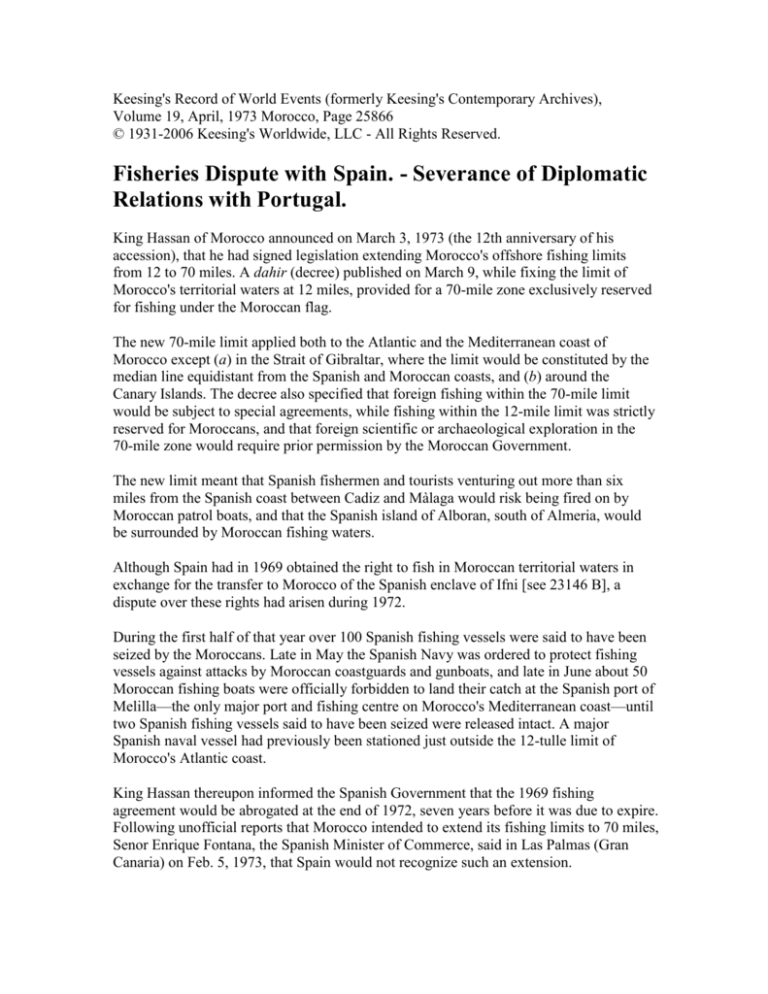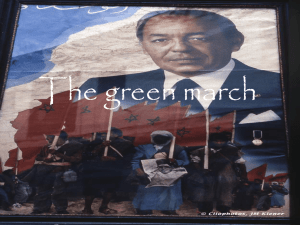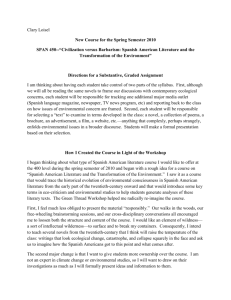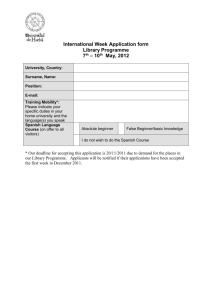
Keesing's Record of World Events (formerly Keesing's Contemporary Archives),
Volume 19, April, 1973 Morocco, Page 25866
© 1931-2006 Keesing's Worldwide, LLC - All Rights Reserved.
Fisheries Dispute with Spain. - Severance of Diplomatic
Relations with Portugal.
King Hassan of Morocco announced on March 3, 1973 (the 12th anniversary of his
accession), that he had signed legislation extending Morocco's offshore fishing limits
from 12 to 70 miles. A dahir (decree) published on March 9, while fixing the limit of
Morocco's territorial waters at 12 miles, provided for a 70-mile zone exclusively reserved
for fishing under the Moroccan flag.
The new 70-mile limit applied both to the Atlantic and the Mediterranean coast of
Morocco except (a) in the Strait of Gibraltar, where the limit would be constituted by the
median line equidistant from the Spanish and Moroccan coasts, and (b) around the
Canary Islands. The decree also specified that foreign fishing within the 70-mile limit
would be subject to special agreements, while fishing within the 12-mile limit was strictly
reserved for Moroccans, and that foreign scientific or archaeological exploration in the
70-mile zone would require prior permission by the Moroccan Government.
The new limit meant that Spanish fishermen and tourists venturing out more than six
miles from the Spanish coast between Cadiz and Màlaga would risk being fired on by
Moroccan patrol boats, and that the Spanish island of Alboran, south of Almeria, would
be surrounded by Moroccan fishing waters.
Although Spain had in 1969 obtained the right to fish in Moroccan territorial waters in
exchange for the transfer to Morocco of the Spanish enclave of Ifni [see 23146 B], a
dispute over these rights had arisen during 1972.
During the first half of that year over 100 Spanish fishing vessels were said to have been
seized by the Moroccans. Late in May the Spanish Navy was ordered to protect fishing
vessels against attacks by Moroccan coastguards and gunboats, and late in June about 50
Moroccan fishing boats were officially forbidden to land their catch at the Spanish port of
Melilla—the only major port and fishing centre on Morocco's Mediterranean coast—until
two Spanish fishing vessels said to have been seized were released intact. A major
Spanish naval vessel had previously been stationed just outside the 12-tulle limit of
Morocco's Atlantic coast.
King Hassan thereupon informed the Spanish Government that the 1969 fishing
agreement would be abrogated at the end of 1972, seven years before it was due to expire.
Following unofficial reports that Morocco intended to extend its fishing limits to 70 miles,
Senor Enrique Fontana, the Spanish Minister of Commerce, said in Las Palmas (Gran
Canaria) on Feb. 5, 1973, that Spain would not recognize such an extension.
The Spanish Government subsequently entered into negotiations with Morocco on the
conclusion of a new fisheries agreement to replace that of 1969, which had been
terminated on Dec. 31, 1972. However, these talks, held in Rabat, were broken off in
mid-March because, the Spanish side said, the Moroccan proposals were "surprising and
completely unacceptable". Senor Lopez Bravo, the Spanish Foreign Minister,
nevertheless said on March 27, after returning to Madrid from talks with his Moroccan
counterpart, M. Ahmed Taibi Benhima, that the "state of extreme tension with Morocco"
had been "eased".
During April, however, Spanish and Moroccan naval vessels exchanged gunfire on
several occasions and the Moroccans temporarily seized a number of Spanish fishing
boats.
On April 2 a Spanish Air Force plane and a Moroccan naval launch exchanged fire after
the launch had arrested the Spanish fishing vessel Besugo 23 miles off Morocco's
Atlantic coast; the Besugo was later taken to Agadir, following the earlier seizure of
another Spanish boat on April 1. On April 3 the Spanish Navy arrested four Moroccan
fishing boats near Tarifa, Spain's southernmost point, and confiscated their catch. In all
these cases the fishermen seized were released after payment of fines, the Besugo being
allowed on April 13 to return to her home port of Vigo.
Two further incidents, reported on April 25, involved (a) a Spanish destroyer, which,
about 20 miles off the Moroccan coast, attempted to free a Spanish fishing boat seized by
a Moroccan gunboat, whose captain threatened to execute eight Spanish fishermen
arrested and taken aboard the Moroccan naval vessel, and (b) a Spanish trawler hit by
machine-gun fire from a Moroccan launch.
The unilateral extension of Morocco's fishing limits also affected the activities of
Portuguese and French fishermen. King Hassan had previously announced on June 16,
1972, that Morocco had broken off diplomatic relations with Portugal in accordance with
a resolution adopted by the Assembly of Heads of State and Government of the
Organization of African Unity in Rabat [see 25371 A]. French fishing interests were
safeguarded by the formation during March 1973 of a Moroccan company, in which
representatives of the French fishing industry would hold 40 per cent of the shares, the
remainder being subscribed by Moroccan organizations.
The Spanish-Moroccan dispute was again discussed by Senor Lopez Bravo and M.
Benhima, when the latter visited Madrid on April 24 to present a personal message from
King Hassan to General France. In a communique issued at the end of these talks on
April 26, no progress towards a settlement of the dispute was reported, although both
sides affirmed their desire to preserve their friendship. M. Benhima stated afterwards:
"We have eliminated distrust, overcome a tense situation and created new bases of
reality."—(Times - Daily Telegraph - Financial Times - International Herald Tribune - Le
Monde - Neue Zurcher Zeitung)
(Prev. rep. spanish-Moroccan Relations, 24125 A; 23146 B.)
© 1931- 2008 Keesing's Worldwide, LLC - All Rights Reserved.










